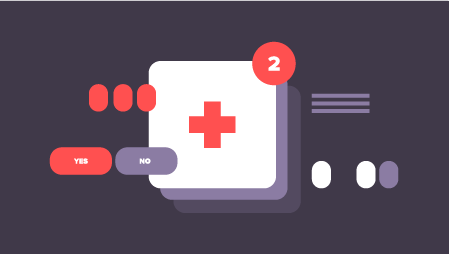The COVID-19 outbreak is creating chaos across the world and has affected all of us drastically. It has entirely changed the way millions around the globe. With the outbreak around, we are all going through testing times.
Thanks to digitization fuelled by advanced technologies and the rapid proliferation of smartphones, India’s industry is booming. The fast-paced and hectic life and rise in disposable incomes have boosted initiatives across urban areas worldwide.
The Healthcare industry needs the help and support of advanced and new technologies like the Internet of Things (IoT), Artificial Intelligence (AI), Machine Learning, and Big Data to battle and look forward to the new diseases. We all focus on reviewing the role of AI as a powerful technology to inspect, analyze, encourage for prevention, and fight with COVID-19 (Coronavirus) and other pandemics.
As per Statista, the healthcare mobile app market will grow to over 11 billion dollars by 2025. It knows that our goal is to come with a digitalized solution that can help to empower the healthcare industry in the future.
Human services conveyance needs the help of new advances like Artificial Intelligence (AI), Internet of Things (IoT), Big Data, and Machine Learning to battle and look forward to the new sicknesses. We plan to audit the job of AI as an incredible innovation to investigate, set us up for anticipation, and battle with COVID-19 (Coronavirus) and different pandemics.
The COVID-19 epidemic is the first global public health crisis of the 21st century. And today, multiple AI-powered projects based on big data, ‘machine learning, ‘or ‘data science’ are being utilized over a broad range of fields to foresee, describe and manage all various scenarios caused by the health crisis.
Artificial Intelligence is being utilized to help and support to make decisions. “No choices or decisions, at any step, are completely, fully and exclusively assigned on the algorithm,” explains Nuria Oliver, data scientist. He holds a doctorate from the Media Lab at Massachusetts Institute of Technology (MIT) and is the Regional Government of Valencia’s commissioner on AI matters.
AI is positively contributing to battle the Coronavirus Epidemic. Projects directly related to medical, pharmacology, and hospital care, to reduce virus have discovered a crucial ally in information science to make progress and deliver results.
Machine Learning and AI both play a crucial role in fighting with the epidemic situation brought on by Coronavirus, with technological innovation and ingenuity being applied to large volumes of data to identify patterns and gain insights quickly. Endeavors are in progress to accelerate research and treatment, and better see how COVID-19 spreads.
As the world battles with the coronavirus pandemic, every bit of the technological innovation and creativity channelized to fight with it and bring us one step closer to the preventive measures.
Machine Learning and AI play a crucial role in better understanding and explaining the coronavirus crisis. AI and Machine learning technological innovation enable computers to mimic human intelligence and rapidly ingest enormous volumes of data to identify and distinguish patterns and insights. Coronavirus has impacted almost every aspect of various industries whether it is tourism, hospitality, events, or mobile app development agencies.
In the fight against COVID-19, organizations have been quick to apply their machine learning expertise in several areas: scaling customer communications and understanding how COVID-19 spreads and speeds up research and treatment.
AI and machine learning technology are being used to study the virus directly and spread, speed up the testing and implementation of new treatments, expedite and improve accuracy in diagnosis, and analyze the Pandemic’s broader public health impacts. Emotion AI is being used to gauge public response and inform policy decisions around health containment efforts and communication strategy with the public. Both AI and emotion AI play an essential role in our response to COVID-19 as a society – let’s take a closer look at the specific ways they are doing so.
The role of AI in defending against the COVID-19 Pandemic
Physicians and clinical researchers have been utilizing machine learning algorithms and AI for several years to support various projects. It was a natural fit to incorporate those technologies in addressing the COVID-19 Pandemic when it arose in early 2020.
The most critical factor in containing and responding to the virus is to know who has it and when. This has been the most significant barrier in many locations due to the long gap between infection and symptoms, and the lack of a robust tracking program to identify conditions and potential interactions.
AI has been used to address COVID-19 by helping doctors better understand who has the disease, who is likely to have gotten it or get it in the future from those sick individuals, and to use those findings to ensure the proper resources are allocated where they are most needed precisely when they are required. Hospitals and healthcare centers are using healthcare mobile app development solutions to cope with COVID-19.
Data is being captured at hundreds of points, including hospital triage, mobile device data, and search patterns to identify where people are sick, when public perception of the disease changes in a single location, and how people are generally responding to the development of infections locally. AI can much more rapidly parse large data sets captured from cameras, medical data, and mobile device data than humans and create a viable map to inform those decisions.
How emotion AI is supporting the fight against COVID-19
Where machine learning and AI are being used to identify patterns in the spread and treatment of COVID-19, emotion AI is being used to measure the Pandemic’s emotional and social response.
Cognovi Labs, a behavioral analytics company out of Ohio, uses artificial intelligence to build a Coronavirus Panic Index that actively measures conversations on Twitter, Reddit, Facebook, personal blogs, and other platforms to identify common patterns that correlate to emotions. A machine learning algorithm can then measure the overall “mood” of different sectors of society to determine how people respond to the Pandemic on a scale of 0 to 100.
Emotion AI helps banks and financial institutions provide better communication and customer interaction to streamline and improve the debt collection process. As the number of non-performing loans soars due to the impact of the economic crisis brought on by COVID-19, this becomes increasingly important. Rather than the typically emotional conversation between creditor and debtor, AI is helping to identify the most effective ways to diffuse a situation, provide support to those who cannot pay their loans, and chart a path to repayment that works.
WRAPPING UP
The Healthcare sectors are in a critical requirement of innovative technologies for decision-making to handle this COVID-19 epidemic worldwide and help them in getting appropriate recommendations in real-time to keep away from the spread. Machine Learning, IoT, and AI work in a professional way to mimic human intelligence. It also plays a critical role in understanding and suggesting the development of a vaccine for COVID-19. This result-driven technology is used to properly screen, analyze, predict, and track current patients and likely future patients.





